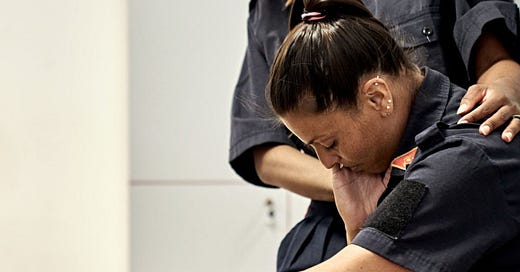The Silence Around First Responder Trauma
By Suzz Sandalwood | The article highlights the trauma first responders can experience in a culture that often discourages vulnerability, making it hard for them to seek help.
Written by
| Seeking Veritas Columnist | Sankarsingh-Gonsalves ProductionsThe life of a first responder is often defined by courage, selflessness, and the relentless pursuit of saving lives and making a difference. While society reveres these individuals as heroes, a complex and deeply ingrained culture exists within the job. One that can stigmatize vulnerability, minimizes the psychological impact of their work, and perpetuate quiet suffering. In my personal and professional life alongside first responders, I’ve witnessed many individuals that are quietly struggling. Admitting that parts of the job are heavy feels almost impossible in a culture that equates strength with silence.
EXPOSURE TO TRAUMA ISN’T AN “IF”, IT IS A WHEN
For first responders, exposure to trauma isn’t an if, it is a when; it’s a certainty. Every shift holds the potential to encounter the unimaginable whether it is horrific accidents, death, violence, or heartbreak. Over time, these experiences and stories can linger inside the mind. Some carry these stories silently, unsure how or if they can unburden themselves.
The impact of trauma doesn’t always show itself right away. It can linger in the background, weaving its way into someone’s thoughts, their relationships, and their sense of self and is not always visible. The way the job can impact a first responder can show up in many ways and forms and some of those can be subtle, mistaken for other life factors. For some, it can lead to operational stress injuries or PTSD, leaving them feeling isolated in a world that often doesn’t see their pain. This is not only true for those in active roles, but also those that have retired.
PUBLIC AWARENESS IS NOT ENOUGH
First responders have often shared with me the frustration of feeling ill-equipped to manage the enormity of trauma in their work. In recent years, public awareness about the support needs of first responders has grown but I can see more could be done. Public education cannot be the end of the conversation. While awareness is an essential first step, it is not enough to change the culture of silence and stigma that surrounds mental health in first responder communities. Even when programs and support are available, stigma and fear often stop individuals from reaching out for many reasons.
VULNERABILITY CAN FEEL CONTRADICTORY
In first responder culture, the role of the helper can be deeply tied to identity. These individuals are trained and conditioned to be the ones who step up when others step back. Asking for help can feel contradictory to their role, creating an unspoken stigma that vulnerability equals weakness.
This stigma can be compounded by fears of career repercussions. Some worry they’ll be labeled as weak or less capable, passed over for promotions, or reassigned to “other” duties as they have seen happen. How can someone believe “it’s okay to not be okay” when asking for help might change the trajectory of their career?
QUIET SUFFERING IN A CULTURE THAT NEEDS TO SHIFT
Breaking the cycle of quiet suffering among first responders requires a multifaceted approach rooted in compassion, understanding, and intentional action. The quiet suffering calls for more than just policies or resources. Trauma doesn’t just need to be acknowledged, it needs to be met with real cultural change but there are many layers to unpack about where cultural change should begin.
This isn’t about checklists or platitudes. It’s about safety when admitting struggle isn’t just acceptable but expected. It’s about acknowledging that even those who are entrusted with the responsibility of saving lives are not immune to the weight of their own challenges. It’s about humanizing those challenges.
So, what would that cultural shift look like and how do first responder services get there? These are not new questions or conversations, next week I will dive deeper into what it might look like to feel truly supported in meaningful, authentic ways as a first responder.
About the Author:
is an Advanced Certified Clinical Trauma and Addiction Specialist and a Certified Grief Counsellor. She has extensive professional and lived experience in first responder, addiction, and grief communities. | Connect with the author: https://suzzsandalwood.com/Sankarsingh-Gonsalves Productions. 2025 ©️





